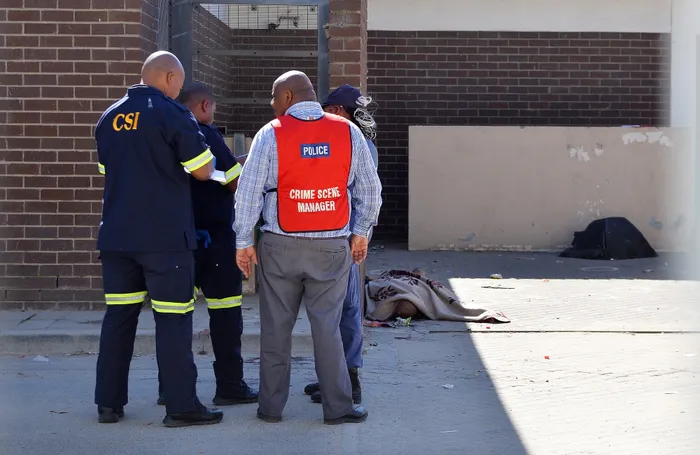Nkohla shooting ‘an assassination’

The lifeless body of Loyiso Nkohla after he was shot multiple times. PICTURE: Phando Jikelo/ African News Agency (ANA)
Disbelief and sadness were written all over the faces of family, friends and colleagues who gathered at Philippi railway station after former Ses'khona People's Rights Movement leader and ANC councillor Loyiso Nkohla was shot dead on Monday April 18.
The 40-year-old was shot multiple times inside the premises of what used to be a railway police station where he was having a meeting with community members.
Three other people, including former Ward 80 councillor Thembinkosi Pupa, were wounded during the shooting and were rushed to a hospital.
Police spokesperson Warrant Officer Joseph Swartbooi said the circumstances of the shooting were under investigation.
He said Mr Nkohla was declared dead on the scene by medical personnel.
“The unknown suspects fled the scene and are yet to be arrested. The motive for the attack is yet to be determined.”
As the news of Mr Nkohla’s death spread, residents and politicians from various parties started gathering at the scene.
One of the witnesses, who did not want her name to be published, said more than 20 bullets were fired.
She said she was on the way to the meeting but was running late when she heard gunshots and saw four men leaving the railway station.
She believes that the suspects might have been waiting inside the premises as the shooting took place after an opening prayer was conducted before the meeting could start.
The meeting was about facilitating a way forward for the shack dwellers who have occupied the central railway line, so that the Passenger Rail Agency of South Africa (PRASA) can restore train services in and around Philippi.

Deputy Minister of Rural Development and Land Reform Mcebisi Skwatsha was among the first people on the scene and described Mr Nkohla’s death as tragic.
He said as soon as he heard about what had happened he rushed to the crime scene.
Mr Skwatsha said he knew Mr Nkohla very well, especially when he was still a member of the ANC.
He described him as a devoted community activist who fought for those who were living in appalling conditions.
Family friend and EFF member, Mbulelo Dwane said he had had breakfast with Mr Nkohla in Gugulethu about an hour before Mr Nkohla was shot and he saw on Twitter that he had been killed.
Mr Dwane said Mr Nkohla buried his mother two weeks ago. He described his death as shocking, saying they had breakfast at 9am and by 10am he was dead.
He described him as a nice man who loved his family and was stubborn at times and he embraced everyone from all political parties.
He said Mr Nkohla had left politics and was now more focused on building his business empire.
ANC provincial parliament member Mohammed Khalid Sayed, who was with Mr Nkohla in his ANC Youth League days, said Mr Nkohla welcomed him in the youth league and encouraged him to build branches of the party in so-called coloured and Indian communities.
He said he lost his life not in some fancy place but where our communities reside.
Mr Nkohla was best known for leading Ses’khona People’s Rights Movement protests against the use of pota-pota bucket toilets in black townships in a 2013, earning him and Andile Lili the description of being a poo-flinging activists as the buckets were emptied at various locations.
The Black People’s National Crisis Committee said in a statement that it strongly condemns the “cowardly assassination” of Mr Nkohla.
“Nkohla was a fearless fighter and advocate for the rights of the poor black people living in informal settlements in the colonial enclave of Cape Town.
“This tragic event serves to highlight the growing culture of political assassinations in South Africa.
“We call on the authorities to expedite their investigation and bring the perpetrators to justice.”
Human Settlements Minister Mmamoloko Kubayi said in a statement that she was saddened by the tragic murder of Mr Nkohla while he was engaging a group of people who had been living on Cape Town’s central railway line.
She said over the past few months, the Departments of Human Settlements and Transport had been working on a plan to relocate people from Siyahlala Informal Settlements to enable PRASA to resume rail services.
She expressed her sincere sympathies to the family, friends, and colleagues of Mr Nkohla.
“Mr Nkohla will be remembered for his activism as a representative for disadvantaged communities. We send our heartfelt condolences to his loved ones for his untimely passing and we will keep them in our thoughts and prayers during this time of sorrow.”
Ms Kubayi urged anyone who might have information that can lead to the arrest of the perpetrators to contact law enforcement agencies.